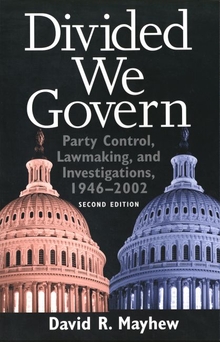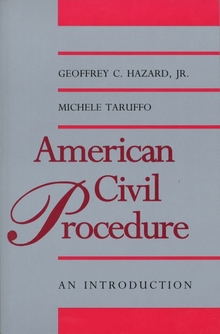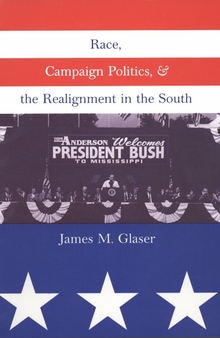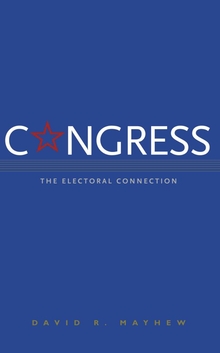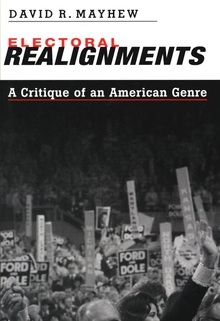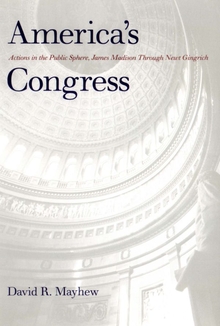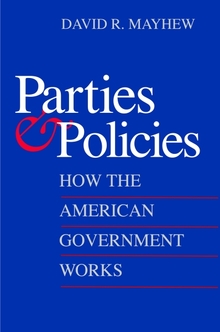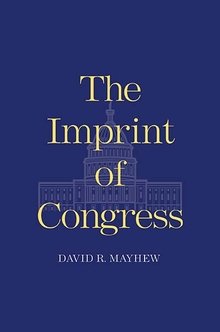Divided We Govern
WARNING
You are viewing an older version of the Yalebooks website. Please visit out new website with more updated information and a better user experience: https://www.yalebooks.com
Party Control, Lawmaking, and Investigations, 1946-2002, Second Edition
David R. Mayhew
“Important, accessible, and compelling, David Mayhew’s second edition of Divided We Govern takes the best book on the history of US lawmaking and—against all odds—makes it better.”—Keith Krehbiel, Stanford University
“In this welcome updating of his agenda-setting classic, David Mayhew cogently defends his original methodology and finds that divided government remains no less productive of important legislation than unified government, although it is now (thanks mainly to Clinton’s impeachment) strongly associated with prominent investigations of the executive branch. Written with Mayhew’s usual clarity and grace, this is a book to be enjoyed by beginning and veteran students of Congress alike.”—Gary Jacobson
From reviews of the first edition:
"First-rate. . . . Mayhew’s tabulations and analysis are, quite simply, unimpeachable."—Morris Fiorina, Washington Monthly
"Will stand for years as a classic."—L. Sandy Maisel, Political Science Quarterly
"Should be read by every student of American politics."—Gillian Peele, Times Higher Education Supplement
“In this welcome updating of his agenda-setting classic, David Mayhew cogently defends his original methodology and finds that divided government remains no less productive of important legislation than unified government, although it is now (thanks mainly to Clinton's impeachment) strongly associated with prominent investigations of the executive branch. Written with Mayhew's usual clarity and grace, this is a book to be enjoyed by beginning and veteran students of Congress alike.”—Gary Jacobson
“Important, accessible, and compelling, David Mayhew’s second edition of Divided We Govern takes the best book on the history of US lawmaking and—against all odds—makes it better.”—Keith Krehbiel, Stanford University
"Mayhew has accomplished the demolition of a major belief about American politics. His book—original, sound, and important—reflects an enormous learning and a great deal of careful work."—Frank J. Sorauf, University of Minnesota
"In Divided We Govern, David R. Mayhew offers his usual superb analysis of American government and politics. He also provides a rationally-developed list of major investigations and legislation that will prove invaluable to scholars in the future. My copy of this book will be well worn. Students of the presidency and Congress are in his debt."—Charles O. Jones, Hawkins Professor of Political Science, University of Wisconsin—Madison
"At last, the long-needed thorough empirical study of one of political scientist's most vexing theoretical questions—whether divided government as the normal state of affairs is to be the starting point for every future study of the role and importance of political parties in American government."—James L. Sundquist, Senior Fellow Emeritus, Brookings Institution
"One of the highest callings of social science is to take a treasured piece of conventional wisdom, something that 'everybody knows is true,' and through painstaking and thorough research, demolish it. David Mayhew has done just that in Divided We Govern. It has been a cornerstone of our debate on the American system of government that divided government was a roadblock to reasonable and constructive policy-making. With care, comprehensiveness and consistency, Mayhew has shown us that, however one measures the quality or quantity of significant policy outputs, there is no real difference between periods of divided government and periods of unified government. So much for the critiques of the American system built on that premise. In the process, Mayhew has also enlightened us about the ebbs and flows of policy movement and innovation in America. And all in 200 readable pages!"—Norman J. Ornstein, Resident Scholar, The American Enterprise Institute
"This is a powerfully argued book, based on prodigious reading and amassing of evidence. It is certain to shake up common beliefs about the impact of unified or divided party control on American governmental performance. It will, and should, provoke widespread discussion and debate. Certainly, it confirms Mayhew's position as the most original and provocative interpreter of contemporary American political institutions."—David Price, Member of Congress
"Historians who read this book will encounter research and analysis that represent the best of political science. Mayhew's knowledge is impressive, his methods clear and careful, and his writing lucid, straight-forward, and highly sophisticated. . . . Selection criteria are fully and convincingly selected . . . . Mayhew shows that congressional investigations seeking to expose the executive were not more frequent under divided government, and that important legislative enactments were about as numerous per year of divided government as they were per year of unified government. . . . A mark of the book's excellence is that the author responds, respectfully but effectively, to objections and qualifications likely to occur to well-informed scholarly readers."—Leon D. Epstein, University of Wisconsin-Madison
"Mayhew . . . . challenges the conventional wisdom. . . . His finding suggests that governments with a Republican President and a Democratic Congress, seen as the norm in recent years, may not be cause for so much consternation as many people believe."—Robert Pear, The New York Times
"[An] elegantly persuasive destruction of [the] discipline's conventional wisdom. . . . Mayhew's knowledge is impressive, his methods clear and careful, and his writing lucid, straightforward, and highly sophisticated."—Leon D. Epstein, Journal of American History
"In Divided We Govern, David R. Mayhew . . . provides us with a first-rate study of the operation of American government during both unified an divided periods between 1946 and 1990 and finds nothing in the historical record to suggest that periods of divided government are any less productive than periods of unified control. . . . Mayhew's tabulations and analysis are, quite simply, unimpeachable."—Morris Fiorina, Washington Monthly
"Mayhew's study of divided government in the United States in the years since World War II, like his earlier work on competition in congressional elections (Congress: The Electoral Connection) will stand for years as a classic. . . . His knowledge is encyclopedic; and his methods are models of thoroughness. . . . Once Mayhew has provided the lists of investigations and major acts of Congress, he demonstrates that they were just as likely to happen during periods of unified government as during periods of divided government. The sheer volume of his evidence and the power of his arguments make it virtually impossible to refute Mayhew's conclusion. . . . At the end, one is left to marvel at the breadth of Mayhew's knowledge, at the skill of his analysis, and at the clarity of his argumentation. This is a work to read and reread and to keep close at hand for constant reference."—L. Sandy Maisel, Political Science Quarterly
"This book addresses the notion that American national government functions more effectively when one political party controls both the presidency and Congress, yet divided government of Republican presidents and Democratic Congress has been the norm for the Reagan and Bush presidencies. This volume examines this issue and contends that control by a single party has not made a significant difference."—Sage Public Administration Abstracts
"Mayhew's message is that national government divided between the parties does not necessarily lead to stalemate or conflict so debilitating as to preclude policy innovation. . . . Mayhew looks at the history of the postwar period in which divided government has occurred slightly more frequently (26 years) than government dominated by a single party (18 years) and compares legislative results, policy outputs, and instances of conflict in united versus divided periods. . . . Convincing. Well-written, clearly argued, annotated, indexed, and fully documented."—Choice
"Mayhew has once again produced a volume that will play an important role in any discussion of the American political system for years to come."—John Roos, Review of Politics
"Thoughtful and provocative . . . as a contribution to the understanding of how the American system of separated powers can survive without bringing government to a complete standstill, it could hardly be bettered and should be read by every student of American politics."—Gillian Peele, Times Higher Education Supplement
"Mayhew's book sets a standard to which all reform treatises will be held. . . . This is a powerful thesis for what will clearly become a classic in American politics."—Eric M. Uslaner, Annals of the American Academy of Political and Social Science
Winner of the 1992 Richard E. Neustadt Prize given by the American Political Science Association for the best book on the American presidency
Publication Date: June 11, 2005

